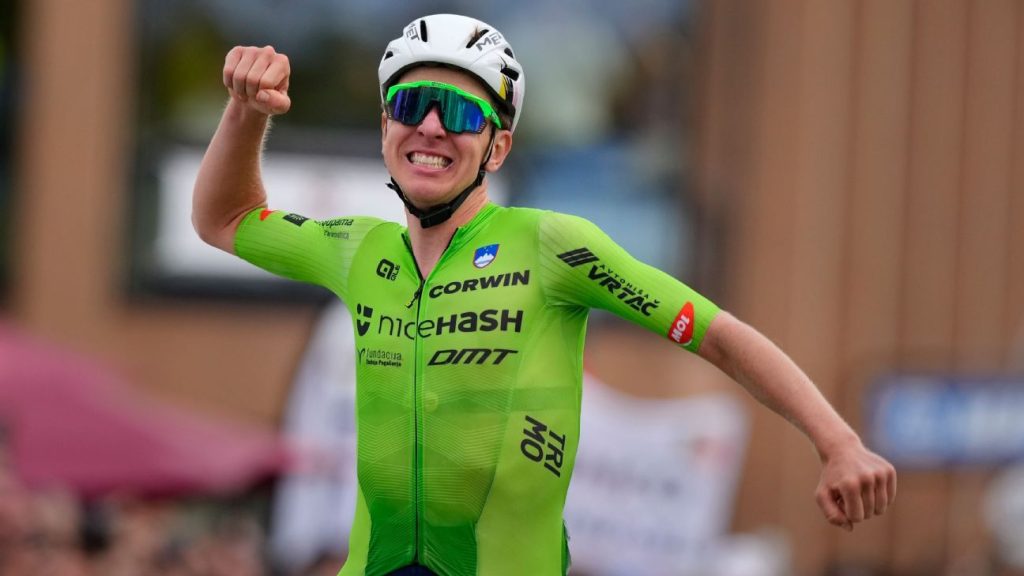
He’s off. And in the first few moments after Tadej Pogacar launches the solo attack that will secure him the world championship, no one quite believes it. He’s off. “It’s a suicide move,” Remco Evenepoel mutters to Mathieu van der Poel beside him. “I didn’t even know he’d gone,” Britain’s Oscar Onley would later recall. “Everyone’s thinking it’s too much,” added Ireland’s Ben Healy. With over 100km remaining in Zurich, the general belief in the peloton is that the world’s best cyclist has just thrown away his shot at the rainbow jersey.
He’s gone. Despite the confusion and disbelief among those left behind, and the surprise that will hit when he crosses the finish line in first place hours later, perhaps the most telling thing about Pogacar’s bold move is that it wasn’t fully planned, but not entirely spontaneous either. He had been organizing his remaining Slovenian teammates at the front for a while. After the race, his UAE Team Emirates teammate Tim Wellens shared that during a recent training ride in Monaco, Pogacar mentioned his plan to attack early. “I thought he was joking,” Wellens confessed.

Of course, Pogacar has a track record in this area. Earlier this year, before Strade Bianche, he announced he would attack on Monte Sante Marie—81km from the finish—and smiled as he said it, so no one took him too seriously. Pogacar often says things in passing, and besides, who attacks from 81km out? Fast forward 24 hours, in pouring rain, and Pogacar accelerates away on Monte Sante Marie, creating an uncatchable gap and winning by nearly three minutes. Was it a spur-of-the-moment decision? Was it planned? Is there even a clear difference between the two?
First, you have the tactical mind games, the performance, the dramatic flair. But in the moment itself, it’s pure racing instinct. A subtle shift in energy, the instinctive sense that your rivals are letting their guard down, the breakaway is gaining ground, and now is the time to strike, so you go. And the legs feel strong, the gap opens more easily than expected, so you just keep going. Pogacar called his Sunday attack “stupid,” but perhaps a better word is “mindless”—that state of flow elite athletes occasionally reach where their decisions are no longer fully conscious, and their body takes control.
And so, with only Il Lombardia and a few more races left, ends one of the most extraordinary seasons in professional cycling history. The legendary Eddy Merckx now believes Pogacar has surpassed him. Evenepoel framed it even more bluntly: “Tadej this year is not normal.” The Giro d’Italia, Tour de France, rainbow jersey, Liège‑Bastogne‑Liège, Strade Bianche—23 race wins in total. Beyond the stats is the overwhelming sense of dominance, the helplessness he imposes on his rivals, and the belief that he can win whenever and however he chooses.
There’s a natural inclination to explain Pogacar’s dominance in purely physical terms—pouring over the data, fixating on wattages and outputs. But given cycling’s history, phrases like “not normal” or “from another world,” as L’Équipe’s headline stated, are not neutral or without baggage. The sport’s past has repeatedly betrayed its believers, leaving many followers in a state of conditional disbelief: the more incredible the performance, the more desperately they want to believe it’s real.
This isn’t the same as the disbelief in fiction, art, or pro wrestling, where the audience knowingly accepts the illusion upfront. Instead, the illusion is constructed gradually, as the viewer’s trust is both reinforced and tested. The more we watch, the more surreal the spectacle becomes, yet at the same time, it becomes even more captivating.
In many ways, this isn’t about Pogacar himself—a rider who has never failed a doping test, denies using banned substances, and hasn’t faced credible accusations beyond simply being exceptional. Doubts and accusations will surely be directed his way, just as they have been at others before and will be at others in the future.
I’ve seen the blogs, the forum posts, the graphs, the Twitter threads. I’ve dug into haematocrit levels and watts per kilo up the Plateau de Beille, and I’ve listened to podcasts where Pogacar shares details about his carb intake per race hour. If that level of scrutiny excites you, and if it’s what it takes to be a Good Cycling Citizen, then fair enough.
But honestly, none of that has ever interested me—not because I’m indifferent to science or the integrity of sport, but because reducing Pogacar to mere numbers and chemical formulas is the most narrow and dull way to appreciate him, or sport in general. Plus, much of the cynicism depends on constructing an alternate version of his career based on minimal facts, with innuendo doing the rest.
Maybe the truth is that every great athlete generates two versions of their story: a graceful one and a cynical one. Which version resonates with us speaks to how we interpret the world. Are we destined to be suspicious, fearful, and doubtful of each other? Or can we still find beauty untouched by corruption, hope beyond futility, and wonder free of cynicism—like winning the world championship from 100km out? I don’t have the answers, and neither do you. But I know which version of the story I’d rather believe in.







